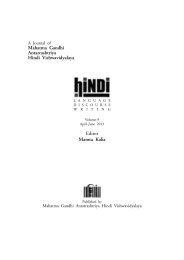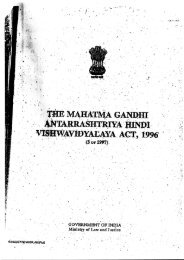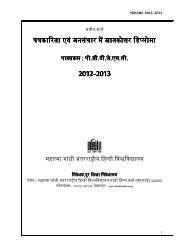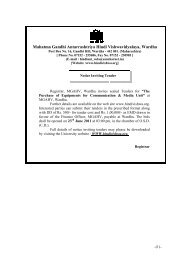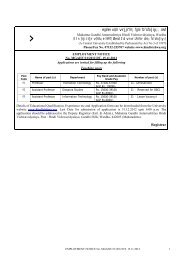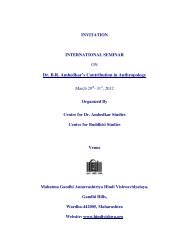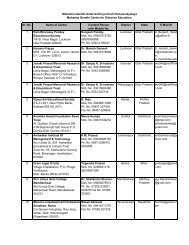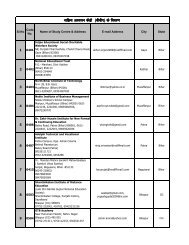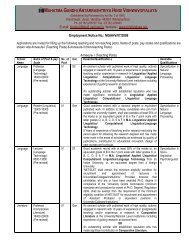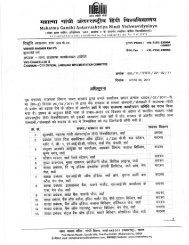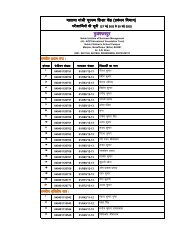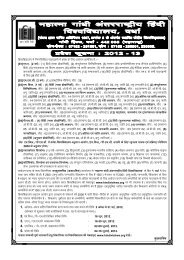A Journal of Mahatma Gandhi Antarrashtriya Hindi Vishwavidyalaya
A Journal of Mahatma Gandhi Antarrashtriya Hindi Vishwavidyalaya
A Journal of Mahatma Gandhi Antarrashtriya Hindi Vishwavidyalaya
You also want an ePaper? Increase the reach of your titles
YUMPU automatically turns print PDFs into web optimized ePapers that Google loves.
He had no desires and he was fearless.<br />
He did not want any favour from politicians.<br />
He wanted social reforms, and<br />
placed his hopes in the younger generation.<br />
His poem ‘mein tumhe apna chumban<br />
dunga’ became very popular among the<br />
students, where he says—<br />
“Mein tumhara hi pata lagaane<br />
ke liye,<br />
Ghumta phir raha hoon,<br />
Saara-saara din, saari-saari raat,<br />
Agaami yugon ke mukti sainik,<br />
Mein tumhari jutiyan chamkaunga,<br />
Dil behlaunga tumhara<br />
Kuch bhi karunga tumhare liye…<br />
Mein tumhe apna chumban<br />
dunga.”<br />
Through these lines he wants to convey<br />
that although he cannot be a part <strong>of</strong><br />
processions or make posters, he can serve<br />
those who make posters and those who<br />
rebel against oppression, because his desire<br />
for freedom is very strong.<br />
Later on, we came to know that Baba<br />
went to jail a number <strong>of</strong> times. Once,<br />
when he wrote a poem on the man who<br />
killed <strong>Gandhi</strong> ji, he went to jail. He was<br />
a mixture <strong>of</strong> Rahul Sankrityayan and Nirala.<br />
He inculcated the roving tendencies from<br />
Rahulji and the satiric language from Nirala.<br />
He did not live with his wife for many<br />
years, having left home in 1934 and coming<br />
back in 1941. But, this poem ‘sindoor tilkit<br />
bhal’ (vermillion smeared forehead) touches<br />
our heart deeply and stirs deep emotions.<br />
It appears to be an autobiographical poem.<br />
His poem ‘danturit muskaan’ shows his<br />
deep attachment to his children. In spite<br />
<strong>of</strong> this, he renounced the happiness and<br />
comforts <strong>of</strong> a family life in order to adopt<br />
a larger family, i.e. the common man.<br />
His love did not remain confined to the<br />
four walls <strong>of</strong> his home, but extended far<br />
beyond. He went out in search <strong>of</strong> those<br />
people whose contribution and dedication<br />
would bring about the much needed social<br />
changes. Later in life he gave up his itinerary<br />
habits and settled down in Sadatpur. One<br />
reason was his detereorating health. The<br />
last time that I met him was in Sadatpur.<br />
He had become so thin that I could hardly<br />
recognize him.<br />
He was a person who interpreted<br />
ideologies on the basis <strong>of</strong> his experience.<br />
He wanted to eradicate poverty and misery<br />
from the lives <strong>of</strong> people.<br />
(Courtesy : Samavartan)<br />
Bageshri Chakradhar, is asstt. pr<strong>of</strong>essor <strong>of</strong> <strong>Hindi</strong> at a college in Delhi<br />
University. She also has a postgraduate degree in music. She writes<br />
poems, literary criticism and essays. She has also written for children.<br />
She is involved with film and documentary production and is a semi<br />
classical singer for Akashwani and doordarshan. Bageshri has attended<br />
conferences and seminars at USA, UK, Canada, Trinidad, Tobago, Thailand,<br />
Indonesia, Nepal and Australia. She has been honoured with a number<br />
<strong>of</strong> awards. She lives in New Delhi.<br />
128 :: January-March 2012



